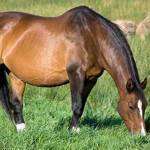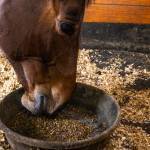Omegas Benefit Broodmares Year-Round

A long checklist of items must be addressed prior to breeding a mare: sire selection, breeding soundness examination, vaccination and deworming review, and assessment of body weight and nutritional status.
“A lot of stars need to be aligned to both achieve pregnancy and maintain it. Horses are notoriously challenging to routinely breed successfully compared to many other mammals, with foaling rates of only about 60-70%,” explained Peter Huntington, B.V.Sc, M.A.C.V.Sc., director of nutrition at Kentucky Equine Research (Australasia).
In terms of nutrition, the amount, quality, and composition of the diet are important.
Amount. Mares with a body condition score (BCS) of 5 or greater (on a 9-point scale) have enhanced fertility, but excessive condition negatively impacts fertility. Further, mares with a BCS of less than 5 that are gaining weight are twice as likely to conceive as open mares with a BCS of greater than 5.
Quality. Although appropriate BCS is integral to reproductive performance in horses, all aspects of a broodmare’s diet need to be critically evaluated—or better still, professionally analyzed—to ensure the overall diet is complete and balanced.
“In addition to feeding high-quality, forage-based diets to achieve and maintain an appropriate BCS, micronutrient balance, especially the trace minerals copper, zinc and selenium, and nutritional supplements also need to be considered,” advised Huntington.
Composition. Supplementing broodmare diets with omega-3 fatty acids could prove beneficial. For example, research in species other than horses indicates that supplementation with omega-3 fatty acids improves follicular growth, influences hormone concentrations, enhances embryo quality, and overall fertility.
During a recent Equine Science Society symposium, Jacobs and coworkers* stated, “Supplementation of long-chain omega-3 polyunsaturated fatty acids improves reproductive, metabolic, and inflammatory health across species.”
Due to the dearth of data demonstrating similar reproductive benefits of omega-3s in horses, Jacobs and colleagues recruited light-horse mares that were fed a diet supplemented with a marine-derived omega-3 starting 60-days before breeding.
Key findings were:
- Omega-3 supplementation resulted in better “endometrial scores,” which are indicators of uterine health, compared with unsupplemented mares; and
- The expression of certain genes important in the development of the embryo in pregnant mares was significantly different between supplemented and unsupplemented mares.
Those findings suggested that the marine-derived omega-3 supplement used in the study fed in the periconceptual period “…may alter the post-ovulatory uterine environment and early embryonic development in the horse.”
Another recent study demonstrated that mares supplemented with eicosapentaenoic acid (EPA) and docosapentaenoic acid (DHA) had higher levels of progesterone, faster involution of the nonpregnant horn after foaling, and reduced post-breeding inflammatory responses. Further, Buist and coworkers** confirmed that mares supplemented with a product providing both EPA and DHA had higher levels of those omega-3 fatty acids in their bloodstream as well as their nursing foals compared to mares and their foals that were not supplemented for the 60 days prior to estimated foaling date.
“KER offers many products that are specialized supplements appropriate for breeding animals, including EO-3, an omega-3 supplement rich in DHA and EPA; Preserve (available in Australia) an antioxidant with natural-source vitamin E, organic selenium, vitamin C, and magnesium; and Nano-E, a natural (d-alpha-tocopherol), water-soluble source of vitamin E. These products have strong antioxidant properties that help with integrity of reproductive tissues, particularly in older broodmares,” said Huntington.
In addition, supplementation with a well-fortified broodmare feed or a balancer pellet ensures mares are fed a balanced diet. For optimal breeding success, seek the assistance of an equine nutritionist when designing diets for broodmares. Avoid overfeeding mares in the first eight months of pregnancy and underfeeding during lactation.
*Jacobs, R.D., A.D. Ealy, P.M. Pennington, et al. 2015. Effect of dietary omega-3 supplementation on equine endometrial and embryonic gene expression. Journal of Equine Veterinary Science 35(5):438-439.
**Buist, S.E., J.M. Kouba, J.D. Lillich, et al. 2015. Peripartum maternal DHA/EPA supplementation and the effect on mare reproductive parameters and foal bone metabolism. Journal of Equine Veterinary Science 35(5):441.








